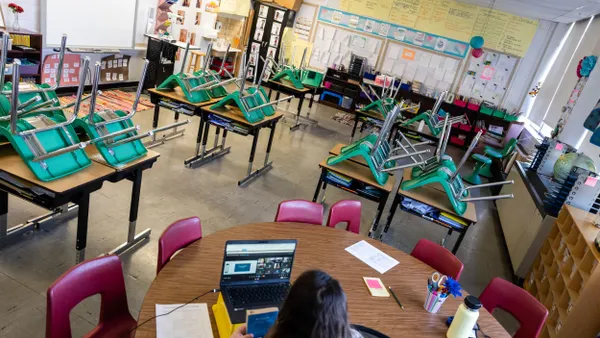Dive Brief:
-
The National Assessment Governing Board is looking to transition the National Assessment of Education Progress, known as the Nation's Report Card, to remote administration in the wake of COVID-19, according to Stephaan Harris, a spokesperson for NAGB. The change could include automated scoring for students' written responses through artificial intelligence.
-
The idea became popular during COVID-19, which made it difficult for states to meet their 95% participation rate requirement in many cases. Now, testing experts agree the update would help districts administer the exam in the future.
-
The NAGB does not yet have a timeline for development and implementation, however. Harris said in an email "we are working through what we can accomplish," and the board will provide a timeline "as soon as it’s feasible."
Dive Insight:
"The pandemic and NAEP’s inability to administer the 2021 assessment provided sobering lessons," wrote Peggy G. Carr, commissioner of the National Center for Education Statistics, and Lesley Muldoon, executive director of NAGB, in a blog update Friday.
"We realized that many of the ideas we had for the future of NAEP needed to be fast-tracked; we needed to be able to reach students regardless of where and how they were learning, and to give the public more real-time, actionable data."
Harris added in an email that "the demands of teaching and delays assessing students during the pandemic clearly indicate that assessment in general and NAEP in particular are at a turning point."
The update comes less than two months after the College Board announced the SAT will be taken entirely online, and after what Carr and Muldoon called "serious internal examination."
"It’s encouraging that NAGB wants to provide additional flexibilities in how NAEP is administered," said Dale Chu, assessment expert and independent education consultant, in an email. "It will be interesting how they handle test security in an online, anywhere environment."
The change is one of various innovations for NAEP currently being studied by the National Academies of Sciences, Engineering, and Medicine, which is expected to soon release a report on the effects of and recommendations for using digital technology in NAEP administration.
Remote administration "could transform NAEP over the next ten years and beyond," the panel conducting the study said, and "could substantially reduce NAEP costs while largely preserving its technical quality and informative value."
Its feasibility has been a question mark for quite some time. "I’m cautiously optimistic about AI, but we need to manage expectations here," Chu said, adding "the technology is not all that great yet from what I can tell."
Carr and Muldoon said they are "working toward" the change, which they described as "the first essential step" in modernizing NAEP. "These are building blocks for a more efficient NAEP," they added.







 Dive Awards
Dive Awards





